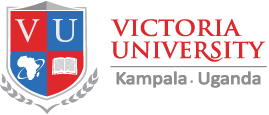Quick Facts
Credential
Diploma
Delivery Options:
Both On-Campus and Online - Some of your Classes will be in-person, on campus and some will be done online.
Duration: 2 years
With a typical full-time course load, this programme will take 2 years to complete.
Language of instruction
english
Admission Requirements
Direct Entry
Candidate must have minimum requirements of admission to a Diploma programme as required by Victoria University Uganda.
Candidates seeking admission on this scheme should have:
i. Credit passes in Mathematics and English at O'level.
ii. At least one principal passes at Advanced level obtained at the same sitting.
iii. The essential subjects are Economics, Geography, Entrepreneurship, Fine Art, Technical Drawing, Literature, Computer Studies, electronics, Mathematics, Physics, Chemistry, Foods and Nutrition, Biology, Healthy Science and Agriculture.
iv. Any other subject done and passed at Advanced level is relevant.
v. General paper and Sub mathematics are desirable subjects.
Foundation Programme
Applicants should have passed with at least a class two (credit) equivalent to 2.80 - 4.39 CGPA.
Mature Age Entry Scheme
A candidate must be at least 25 years of age and should have passed a mature age entry examination conducted by National Council for Higher Education (NCHE) or an institution accredited by NCHE. NCHE recognizes the following institutions’ mature age examinations:
i. Makerere University
ii. Gulu University
iii. Islamic University in Uganda Mbale
iv. Mbarara University of Science and Technology
The eligible candidate must have got at least one principal pass at A’level in relevant subjects and 5 passes at O'level. They should have been obtained at the same sitting not consecutive sittings.
Credit transfer from other universities
Credit transfers from other universities is considered on a one-to one basis depending on the university where you are transferring from and the grades obtained in the relevant modules.
What you will Learn
Discover Your Potential with the Diploma in Information Technology at Victoria University, Kampala
The Diploma in Information Technology will empower you to:
a) Acquire Knowledge Of:
Various Information Technology paradigms
The expansive range of Information Technology applications
The process of system design and development
Problem-solving and effective system design strategies
The theoretical foundations of Information Technology
Cultural, legal, and ethical aspects within the computing domain
b) Develop an Understanding Of:
The intersections between Information Technology and Computer Science
Diverse levels of abstraction, from hardware to high-level languages
Efficient programming and debugging techniques.
Designing user-friendly interfaces
Essential application areas including databases, artificial intelligence, and graphics.
c) Master Practical Skills To:
Craft well-structured programs
Implement substantial software components.
Create comprehensive technical documentation.
Contribute effectively to large-scale system development endeavors.
Excel in communication within a technological context
Embrace teamwork and collaboration.
Cultivate professional and ethical conduct.
d) Gain Proficiencies To:
Recognize the significance of theoretical foundations in practical scenarios.
Develop secure and reliable software solutions.
Adapt swiftly to ever-evolving technological landscapes.
Engage actively in industrial research and development.
Embrace professional conduct that echoes industry standards.
Are you ready to embark on a journey that prepares you not just for the present, but for the future of Information Technology? Join us at Victoria University, Kampala, and unlock a world of possibilities.
Career Opportunities
When you are done with this programme, here are some of the open career opportunities for you.
Software Developer: Craft and maintain software solutions, contributing to application development across various domains.
Web Developer: Design and manage websites, ensuring seamless user experiences and efficient functionality.
Database Administrator: Oversee databases, ensuring data integrity, accessibility, and security for organizations.
Network Administrator: Manage network infrastructure, ensuring connectivity and security for efficient operations.
IT Support Specialist: Provide technical assistance, troubleshooting, and maintenance for software and hardware systems.
Quality Assurance Analyst: Test and validate software applications to ensure quality, functionality, and user satisfaction.
Systems Analyst: Analyze business needs and design IT solutions to enhance operational efficiency.
Data Analyst: Analyze data to derive insights and trends, aiding informed decision-making for organizations.
Cybersecurity Analyst: Protect organizational systems from cyber threats and vulnerabilities, ensuring data security.
UI/UX Designer: Create user-friendly interfaces and experiences for digital platforms and applications.
Project Manager: Coordinate IT projects, ensuring successful implementation within defined timelines and budgets.
Digital Marketing Specialist: Employ IT skills for effective online marketing campaigns, reaching target audiences.
IT Consultant: Provide expert guidance on technology strategies, helping organizations optimize their IT infrastructure.
E-commerce Specialist: Manage online stores, ensuring secure transactions and optimal customer experiences.
AI/Machine Learning Engineer: Develop AI-driven solutions and systems that learn and adapt based on data.
Cloud Computing Specialist: Manage and optimize cloud-based services, enabling scalable and flexible IT solutions.
The Diploma in Information Technology equips you with versatile skills applicable across industries. With technology's growing influence, these career opportunities are highly relevant and offer significant potential for growth and innovation.
Tuition & Fees
The tuition and fee amounts are estimates based on current academic year's rates. For financial planning purposes, please use these totals as an approximate estimate of your costs. Actual fees may vary by term and enrolment activities.
Download
